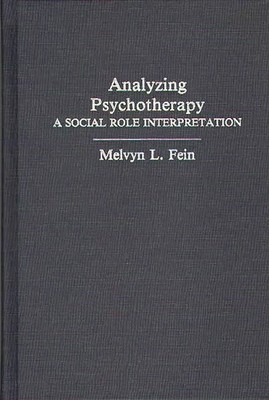
- We will send in 10–14 business days.
- Author: Melvyn L Fein
- Publisher: Praeger
- ISBN-10: 0275939669
- ISBN-13: 9780275939663
- Format: 16.2 x 24.8 x 2.4 cm, hardcover
- Language: English
- SAVE -10% with code: EXTRA
Reviews
Description
This book reinterprets psychotherapy from a social role perspective, permitting a grand synthesis that explains many of the apparent contradictions in contemporary therapy, and challenging the usual definitions of therapy in terms of personality, behavior, and mental illness. Dr. Fein surveys all major therapies, placing them in a role-change context. He documents how each approach specializes in different aspects of role change, and shows that therapies differ only in their level of intervention, phase of resocialization addressed, or barrier to change tackled. All therapies, Fein argues, are inherently psychosocial.
In the work's early chapters, Fein demonstrates that a sociological role perspective offers a full account of what therapy is and how it works; summarizes the resocialization paradigm; and discusses the different levels of intervention (support, socialization, and resocialization). Chapter 3 shows how ostensibly different forms of therapy compare in the aspects of role change in which they specialize, and begins the translation of psychotherapeutic jargon into role-change language by giving a brief overview of how prominent therapies fit into the classifications. In Chapter 4, after presenting a succinct history of Freud's contributions to psychoanalysis, Fein relates particular parts of Freud's work to resocialization. Chapters 5, 6, 7, and 8 discuss various therapy styles and their relation to the author's resocialization approach, including the ecological therapies (family and community), the Romantics (Jungian, Gestalt, Primal Scream, Existential) and the Academics (Behavior Modification, Cognitive, and Stress Management). Chapter 9 asserts that some therapies are actually nontherapeutic because they encourage non-role-change solutions. In his conclusion, Fein emphasizes the ubiquity of resocialization interventions and reiterates the place of sociology in this scheme. This book is excellent reading and analysis for scholars and practitioners in sociology, psychology, and psychotherapy, as well as for anyone interested in understanding how psychotherapy actually works.
EXTRA 10 % discount with code: EXTRA
The promotion ends in 20d.21:34:42
The discount code is valid when purchasing from 10 €. Discounts do not stack.
- Author: Melvyn L Fein
- Publisher: Praeger
- ISBN-10: 0275939669
- ISBN-13: 9780275939663
- Format: 16.2 x 24.8 x 2.4 cm, hardcover
- Language: English English
This book reinterprets psychotherapy from a social role perspective, permitting a grand synthesis that explains many of the apparent contradictions in contemporary therapy, and challenging the usual definitions of therapy in terms of personality, behavior, and mental illness. Dr. Fein surveys all major therapies, placing them in a role-change context. He documents how each approach specializes in different aspects of role change, and shows that therapies differ only in their level of intervention, phase of resocialization addressed, or barrier to change tackled. All therapies, Fein argues, are inherently psychosocial.
In the work's early chapters, Fein demonstrates that a sociological role perspective offers a full account of what therapy is and how it works; summarizes the resocialization paradigm; and discusses the different levels of intervention (support, socialization, and resocialization). Chapter 3 shows how ostensibly different forms of therapy compare in the aspects of role change in which they specialize, and begins the translation of psychotherapeutic jargon into role-change language by giving a brief overview of how prominent therapies fit into the classifications. In Chapter 4, after presenting a succinct history of Freud's contributions to psychoanalysis, Fein relates particular parts of Freud's work to resocialization. Chapters 5, 6, 7, and 8 discuss various therapy styles and their relation to the author's resocialization approach, including the ecological therapies (family and community), the Romantics (Jungian, Gestalt, Primal Scream, Existential) and the Academics (Behavior Modification, Cognitive, and Stress Management). Chapter 9 asserts that some therapies are actually nontherapeutic because they encourage non-role-change solutions. In his conclusion, Fein emphasizes the ubiquity of resocialization interventions and reiterates the place of sociology in this scheme. This book is excellent reading and analysis for scholars and practitioners in sociology, psychology, and psychotherapy, as well as for anyone interested in understanding how psychotherapy actually works.


Reviews